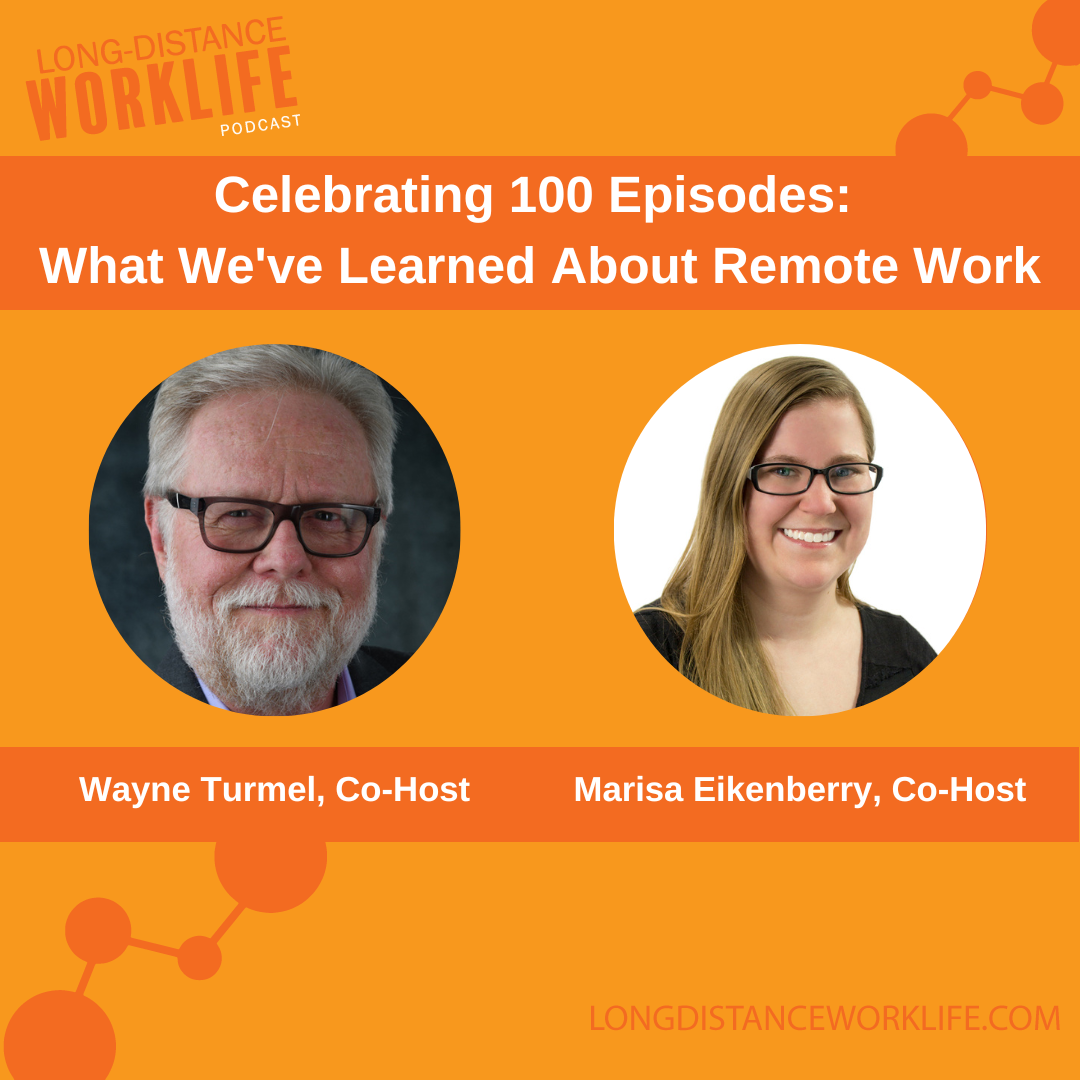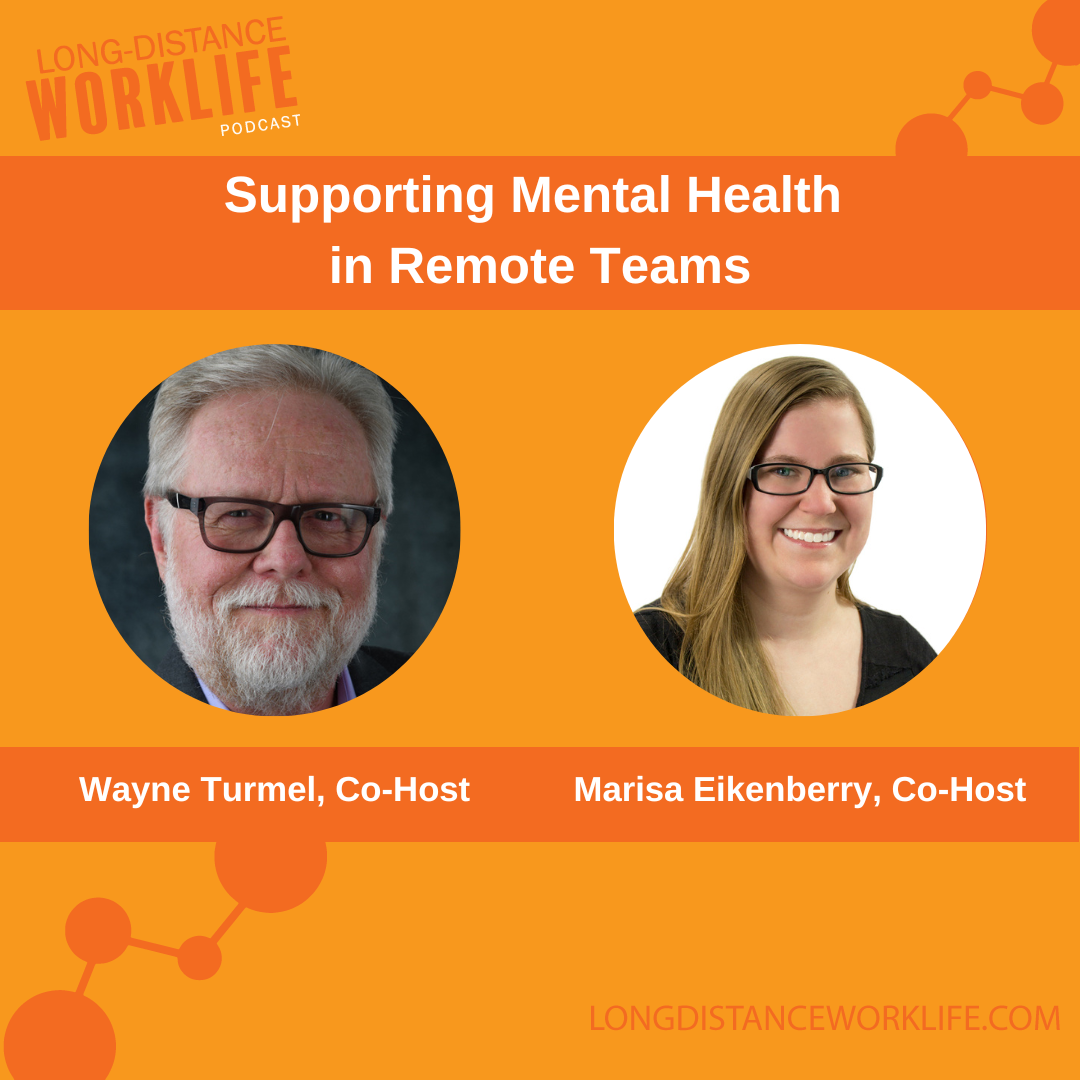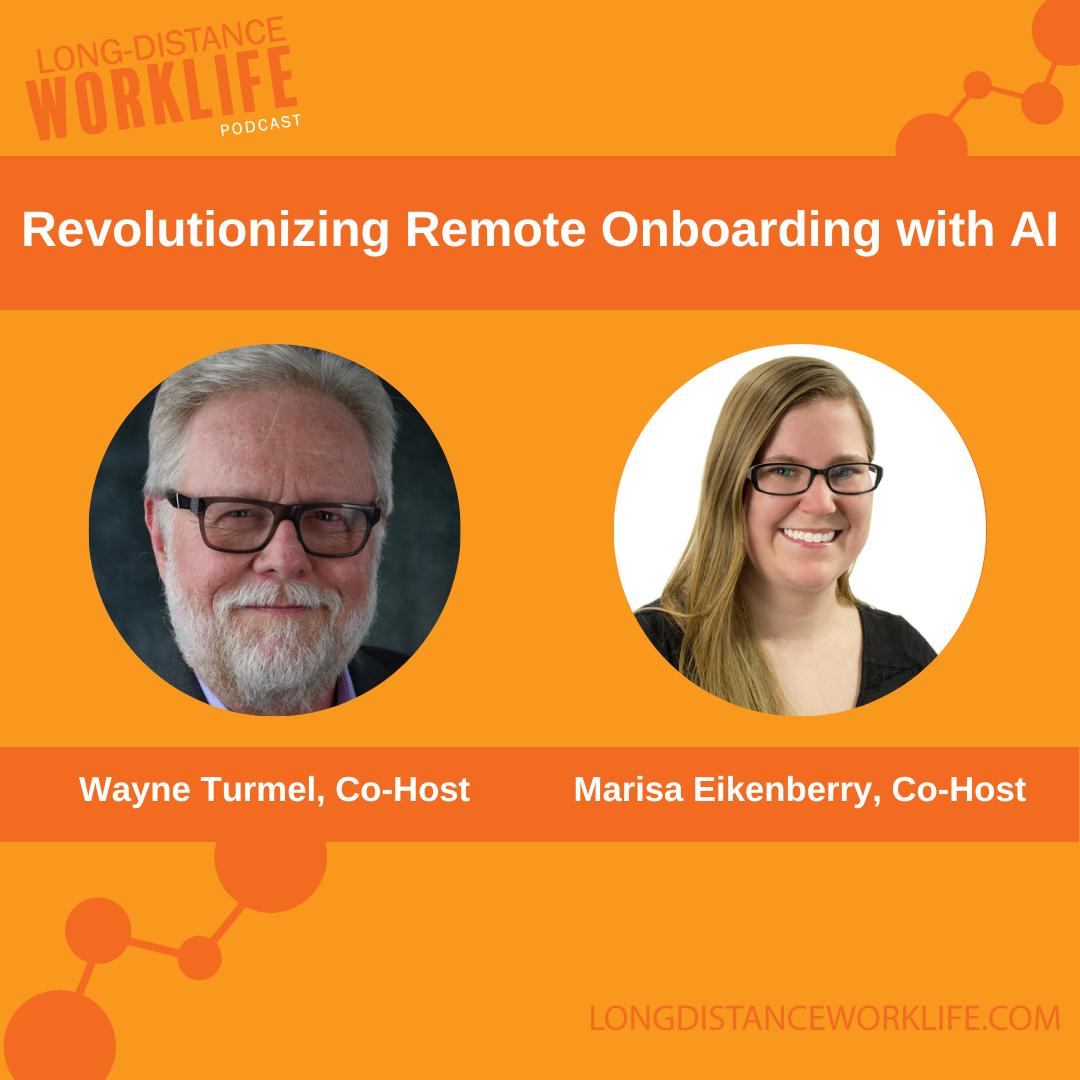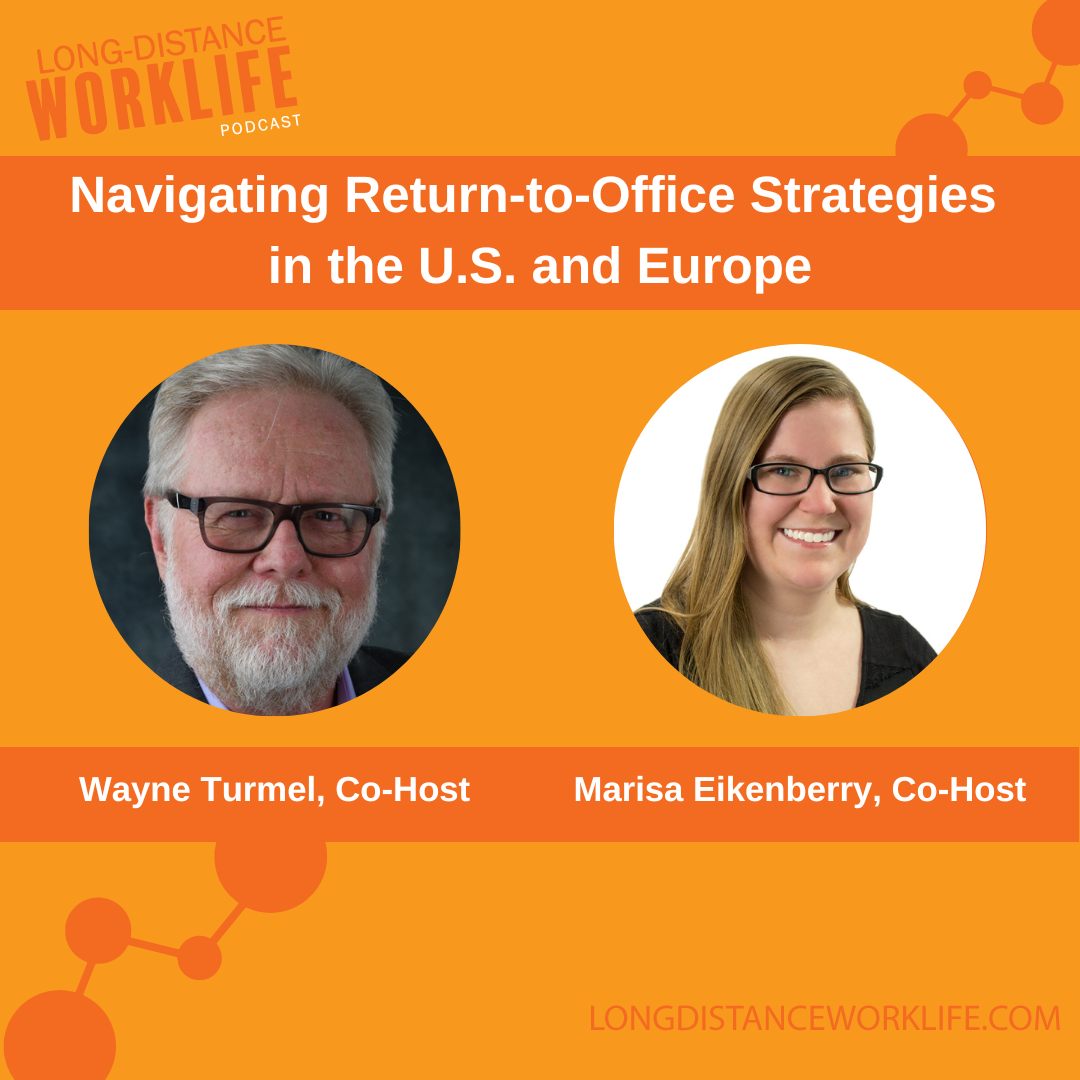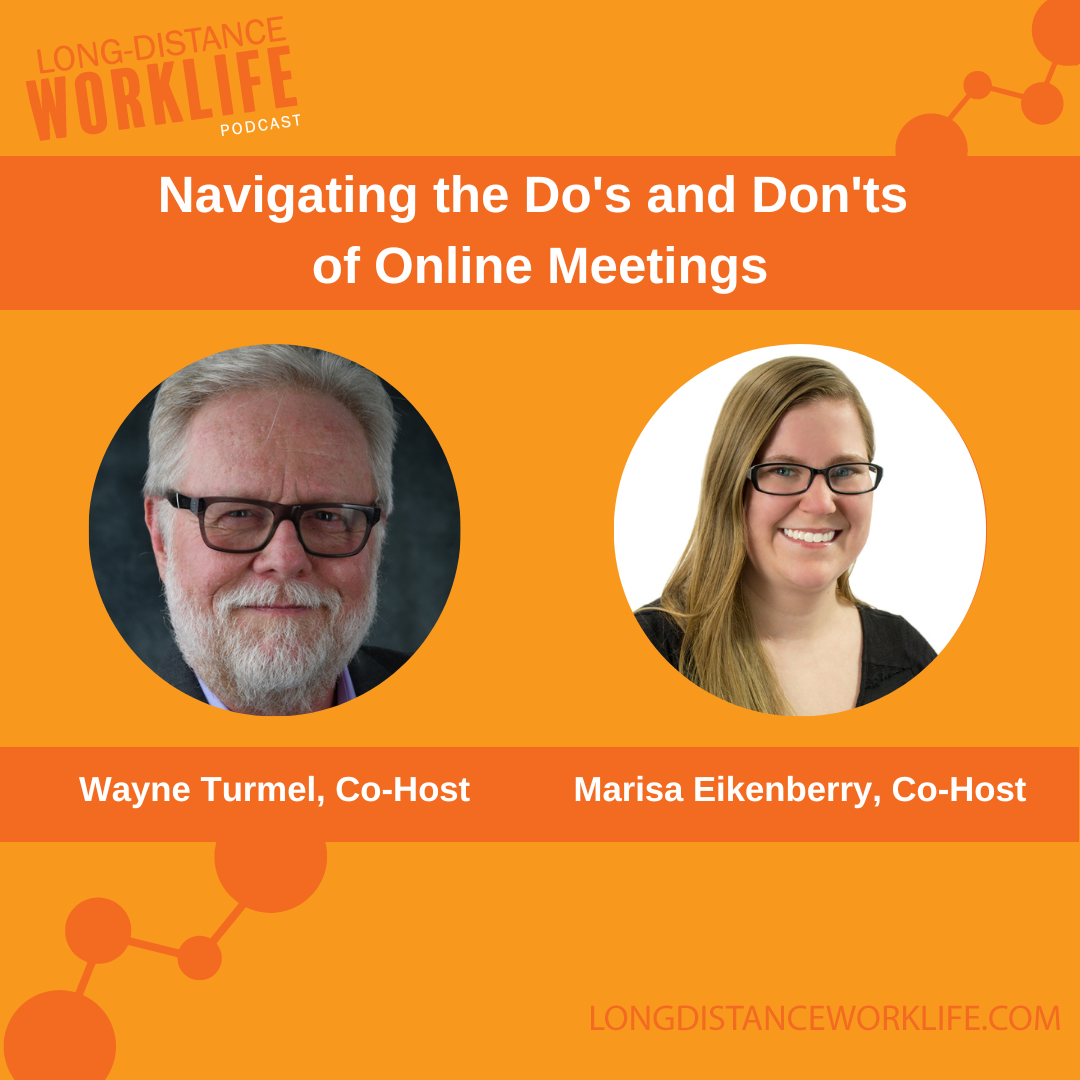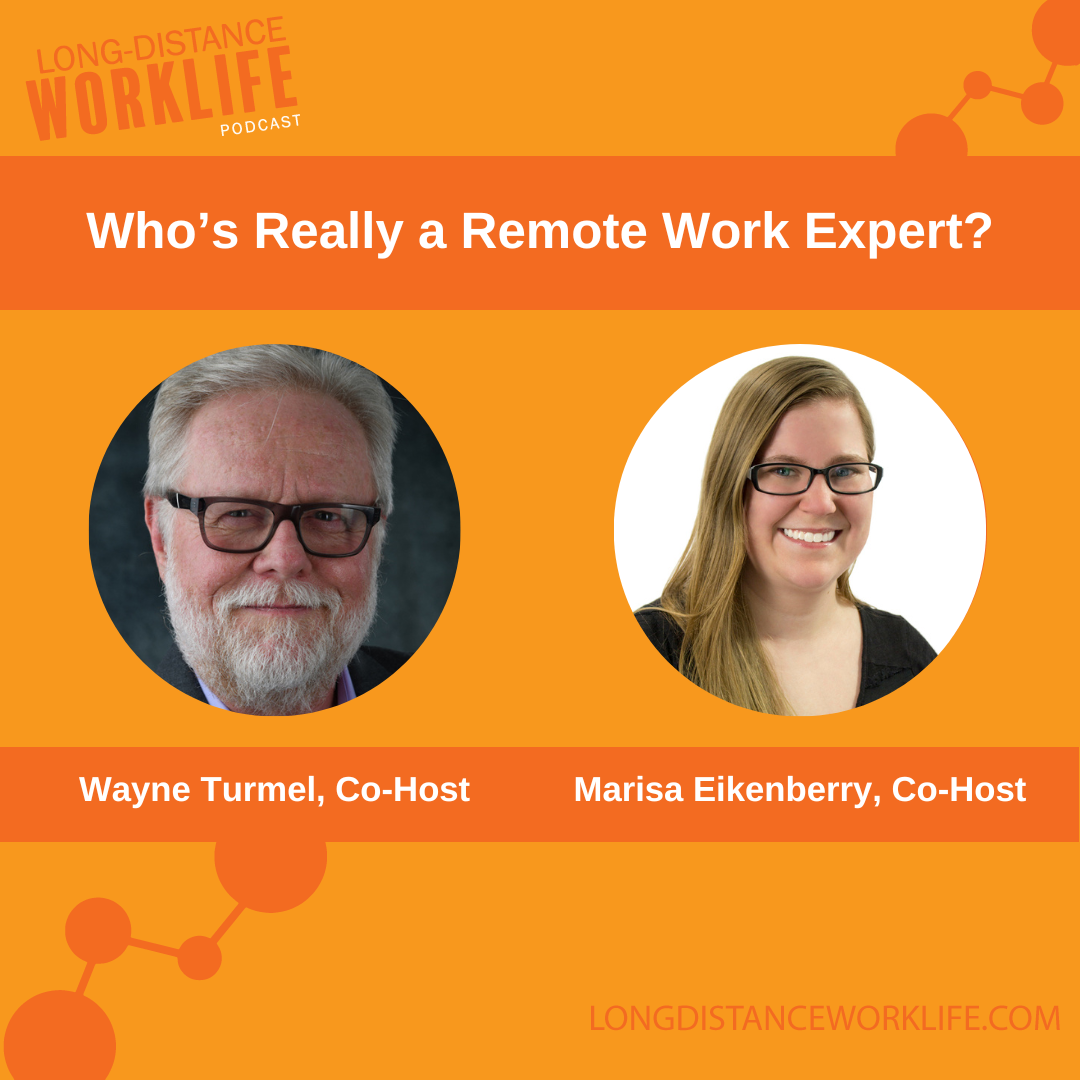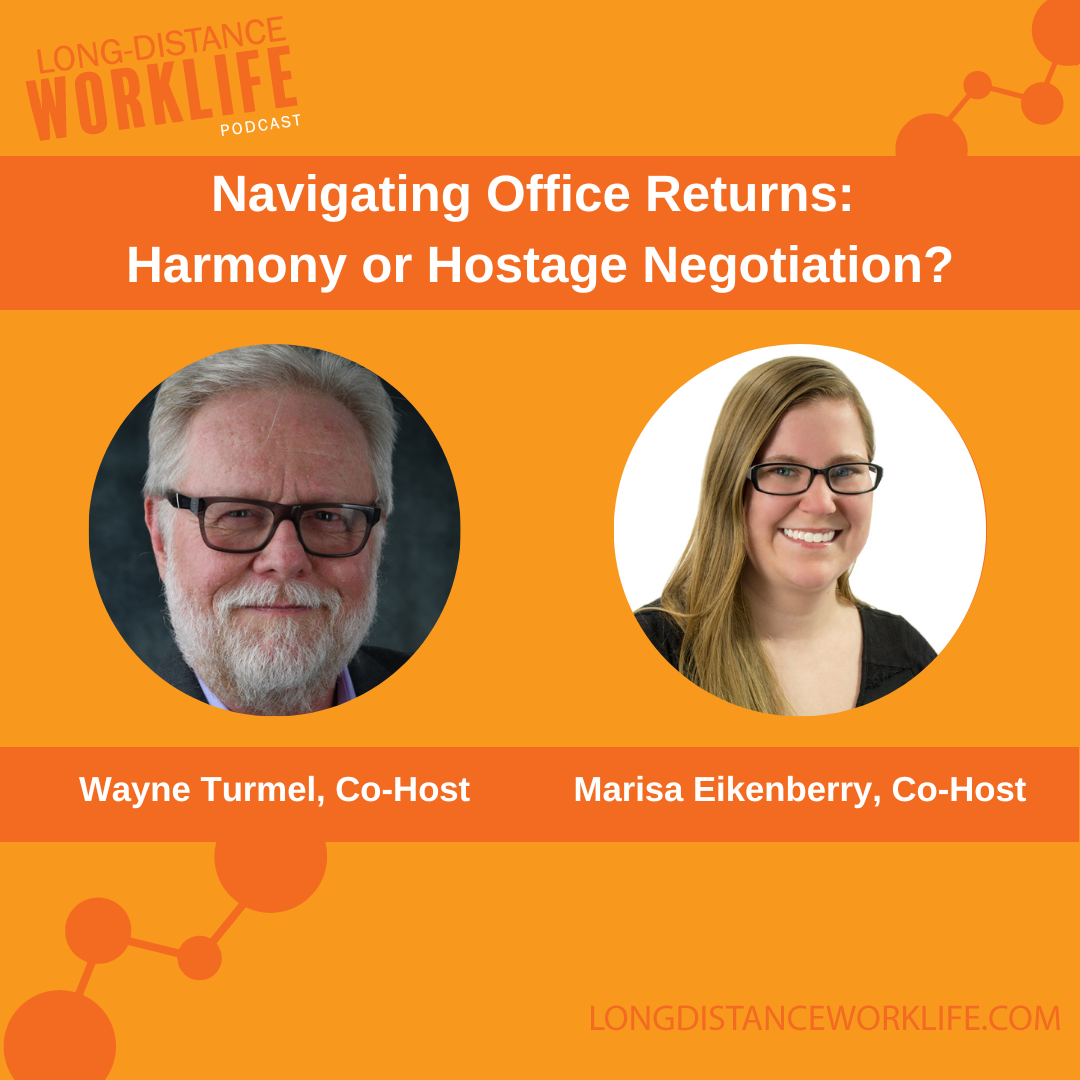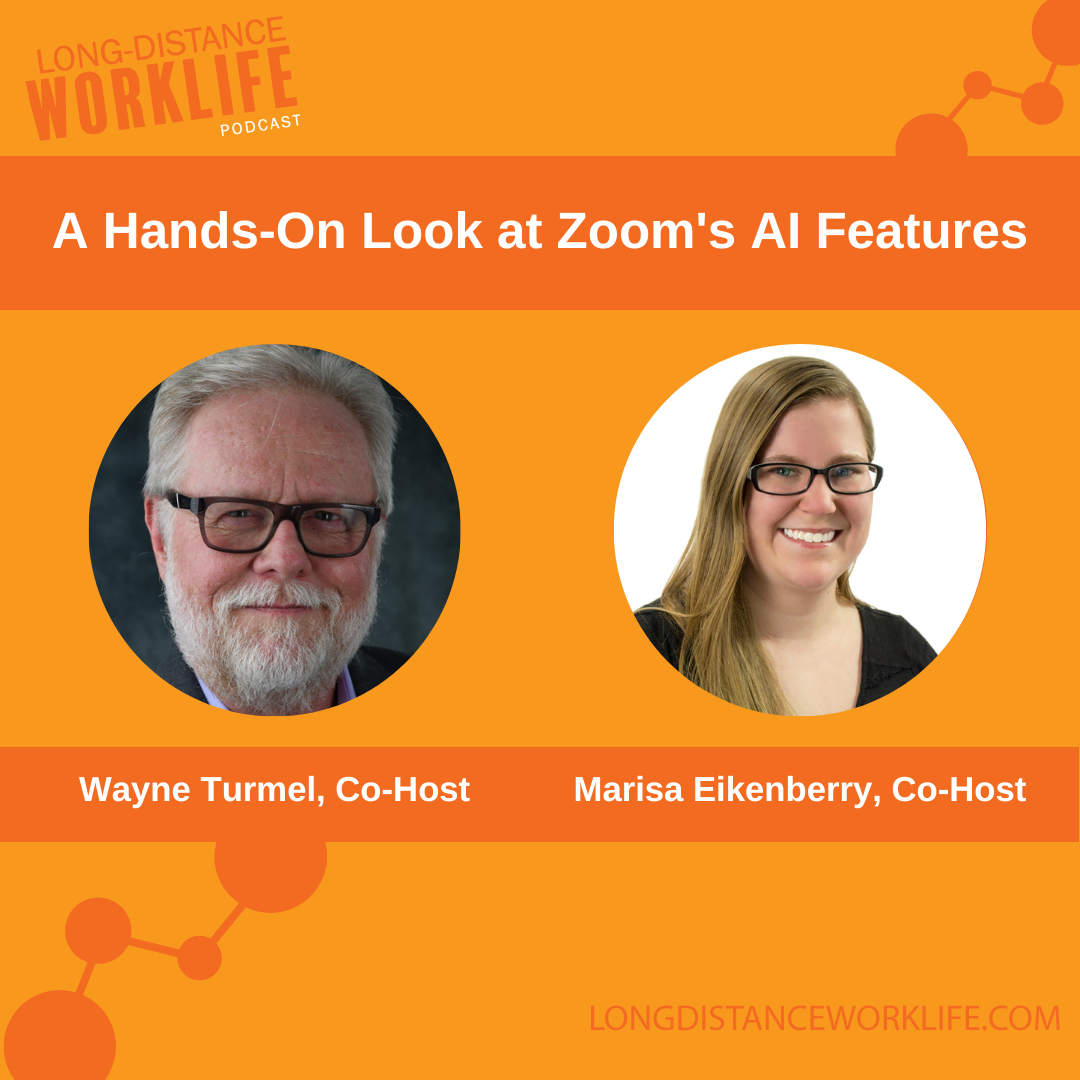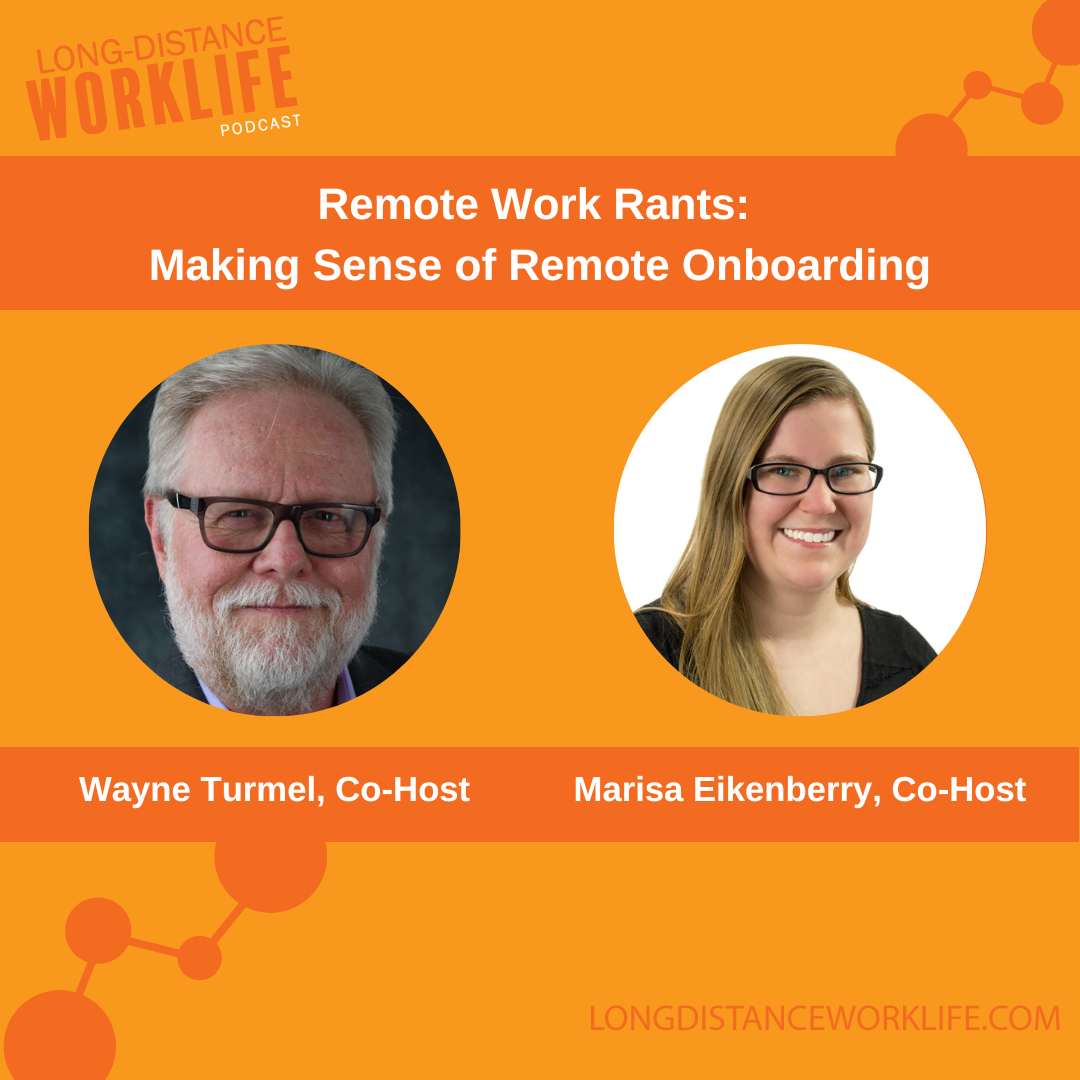In this special milestone episode of the Long-Distance Worklife Podcast, hosts Wayne Turmel and Marisa Eikenberry reflect on their journey through 100 episodes. They share the most impactful lessons and insights they've gained about remote work, leadership, and thriving in hybrid teams. From communication strategies to maintaining work-life balance, this episode is a treasure trove of practical advice and thoughtful reflections. Join us as we celebrate this achievement and look forward to many more episodes to come.
Key Points
- Reflections on reaching 100 episodes
- Top lessons learned about remote work and leadership
- Effective communication strategies in remote teams
- Maintaining work-life balance in a remote environment
- The evolution of remote work over the course of the podcast
- Listener feedback and how it has shaped the podcast
00;00;07;27 - 00;00;09;18
Marisa Eikenberry
Welcome back to the Long-Distance worklife.
00;00;09;23 - 00;00;18;17
Marisa Eikenberry
We help you lead, work and thrive in remote hybrid teams. I'm Marisa Eikenberry, a fellow remote worker. And joining me is my co-host and remote work expert, Wayne Turmel.
00;00;18;19 - 00;00;22;00
Wayne Turmel
I want hello, lady. How are you?
00;00;22;02 - 00;00;23;27
Marisa Eikenberry
I'm great. How are you?
00;00;24;00 - 00;00;39;11
Wayne Turmel
I am swell. Hello, listeners. I am feeling my mortality today as we realize how long we've been. I've been doing this, and you and I have been doing this right. It's been a while.
00;00;39;18 - 00;00;58;18
Marisa Eikenberry
Yeah. So actually, recently, we not only hit our two year anniversary of the show, which I think was somewhere around March 28th. But in addition to that, we have also crossed our 100th episode and we weren't paying attention to it. So we actually missed what the exact 100th episode is. But we decided we're going to talk about that.
00;00;58;19 - 00;01;09;24
Wayne Turmel
18 when you crank out one of these a week and there are 52 weeks in a year times two years, it's sometime in the last couple of weeks.
00;01;10;00 - 00;01;28;07
Marisa Eikenberry
Yeah, somewhere around in there, something like that. And I know we had some weeks where we didn't release an episode at all. And so at first something's off, but that being said, today we're going to talk about the lessons that we've learned through 100 episodes. And in my case, I've only been on 50 of them.
00;01;28;09 - 00;01;43;18
Wayne Turmel
So but you have listened to and edited and been in on the conversations, even on those. And you've been listening to those as a learner, as our audience hears it.
00;01;43;21 - 00;02;03;19
Marisa Eikenberry
That is true. So thinking about our very first episode, which I'm fairly certain was what is remote work or when did remote work start, you know, what were some of the initial expectations that you had when we started the show?
00;02;03;21 - 00;02;37;22
Wayne Turmel
I mean, there's the cynical, pragmatic, take your pick of words, approach, which was we wanted to get the word out about the work that we did absolutely do. Right. And the work that we do as long distance leader and and the classes, our leadership series. And so there was a mercenary component to this. I think it's important that we also, look at our role as offering some perspective.
00;02;37;25 - 00;02;39;07
Marisa Eikenberry
Right.
00;02;39;10 - 00;02;58;15
Wayne Turmel
And one of the things that I did not expect to have happen, and we've gotten some pushback for this, is I did not expect that the most zealous remote work advocates would get cranky with us on occasion.
00;02;58;18 - 00;03;16;15
Marisa Eikenberry
And they do. yeah. I hadn't thought about that until you said that, but there have definitely been some times where we have pushed back against the zealot way of thinking, and we're seem oddly or thought to be the zealots, and we're not.
00;03;16;17 - 00;03;34;00
Wayne Turmel
And that's the thing, is that at the end of the day, our concern for this show and my concern that has driven my entire career in this business, which is literally this week, 28 years, by the way.
00;03;34;02 - 00;03;35;00
Marisa Eikenberry
Wow.
00;03;35;02 - 00;03;38;22
Wayne Turmel
May 6th, 1996 was my first job in the training industry.
00;03;38;27 - 00;03;45;13
Marisa Eikenberry
To say it, I will not comment on the fact I'm only 32.
00;03;45;15 - 00;04;13;12
Wayne Turmel
A two Berta. but, my concern and what has driven me has always been helping people get through work, and the way that we work is changing. And has changed and will continue to change. And there is always the tension between what needs to be done for the employer, for the business, which is a perfectly legitimate concern.
00;04;13;14 - 00;04;39;18
Wayne Turmel
Business doesn't make money, doesn't keep its stores open, people don't have jobs. Our employees owe their employers right the fruits of their labor, and they get a paycheck in exchange. And and so the circumstances of remote work have changed. And the way that we interact has changed. And I think our job is to help people navigate that and make good choices.
00;04;39;21 - 00;04;41;19
Marisa Eikenberry
Right? Absolutely.
00;04;41;22 - 00;04;53;20
Wayne Turmel
this notion that all jobs can be done remotely, while more true than we ever thought it could be. Yeah, is also not universally true.
00;04;53;22 - 00;04;55;27
Marisa Eikenberry
Right. And we've talked about that a lot on this show.
00;04;55;29 - 00;05;02;09
Wayne Turmel
You can work from home all day long if you can find somebody to pay you to do it right.
00;05;02;12 - 00;05;05;21
Marisa Eikenberry
And there are some jobs that they just they can't be remote.
00;05;05;24 - 00;05;42;06
Wayne Turmel
The job, the the purpose of our show is to help people work where and when it makes sense. And we get lumped in frequently with the zealots. And the truth of the matter is, not all work can be done remotely. Not all work should be done remotely, and not everybody is cut out for it. And if you are going to work remotely, if you are unhappy with being in the office all the time in your experiments, experimenting or exploring the idea of remote work, here's how to do it.
00;05;42;06 - 00;05;58;05
Wayne Turmel
And here's how we can help. And we hope that this gets you through it and keeps the weasels at bay. So you know, we are not zealots, nor are we always on the side of the people who say, go into the office.
00;05;58;07 - 00;05;59;15
Marisa Eikenberry
Right?
00;05;59;17 - 00;06;08;17
Wayne Turmel
You know, it's about navigating the realities and hopefully that's what we're bringing. But we've done some stuff. I mean, 100 episodes, good heavens.
00;06;08;17 - 00;06;22;03
Marisa Eikenberry
There's yeah, we've talked about a lot of stuff and so on that line. So like, what has been the most surprising lesson or maybe like an unexpected discovery while we've been doing this podcast?
00;06;22;05 - 00;06;58;09
Wayne Turmel
I think the unexpected discovery was really how so many timeless concepts are relevant in the context of remote work. And I'm thinking specifically about the Johari Window episode that we did with a lot of people fell into. And, I mean, I dealt with the Johari window when the process first came out in the 80s, and people were looking at it and, you know, it was new to my career, and I did all that, and I taught it, and I talked about it and I thought, oh, it's old news.
00;06;58;09 - 00;07;23;09
Wayne Turmel
Everybody knows it. But the purpose, just for those of you who want to go back and listen to it or don't remember, the Johari window says that we look at the world through this window that has four kind of panes to it. Right? There's what we see and we know we see it, and that's what it is. There's what we see and there's stuff there that we don't know.
00;07;23;15 - 00;07;39;24
Wayne Turmel
There's what people see of us that we're aware of. Right. And stuff that people may not be aware of and everything. And of course that's true regardless. And that was a bad explanation. But you can go back and listen to.
00;07;39;24 - 00;07;41;13
Marisa Eikenberry
Yeah we'll have a link in the show notes.
00;07;41;13 - 00;07;56;10
Wayne Turmel
But the point is that there there's always what you see. And there's something unseen behind it when you work remotely or when you lead people remotely, it is literally unseen.
00;07;56;12 - 00;07;58;13
Marisa Eikenberry
Right?
00;07;58;15 - 00;08;20;15
Wayne Turmel
So not only are the there the normal things. Right? Is she telling me the truth when she says she's on time for that project? But I can't look her in the eye. I can't look over her shoulder and see what she's doing. I can't hear the conversations she's having with her coworkers.
00;08;20;17 - 00;08;22;21
Marisa Eikenberry
Can't see her visibly sweating as she tells.
00;08;22;24 - 00;08;38;22
Wayne Turmel
Can't see her visibly sweating or, you know, rolling her eyes or whatever it is. and so that notion of so much what we do in the remote work space is white space.
00;08;38;25 - 00;08;39;13
Marisa Eikenberry
Yeah.
00;08;39;15 - 00;08;42;02
Wayne Turmel
We don't know what's going on there.
00;08;42;04 - 00;08;43;29
Marisa Eikenberry
We are entering into the void.
00;08;44;02 - 00;09;08;02
Wayne Turmel
We need to actively seek it, and we need to have trust that our communication is clear and that people are understanding. And if there is a problem that they are willing to give us that feedback that we're getting, the feedback we need to do the job, whether they're the individual contributor or the, the manager leader, boss. Right.
00;09;08;04 - 00;09;33;05
Wayne Turmel
And so while I knew that to be true, it. Always amazes me how what is true has always been true and continues to be true and will ever be true. And we get lost sometimes in the minutia of the work and the stress of working in new ways and new environments.
00;09;33;08 - 00;09;50;08
Marisa Eikenberry
Right? Well, and I remember when we even talked about doing that episode, you were like, I know I'm thinking about this and, you know, but I don't know. And I was like, what the heck is that? And it was that moment of, oh, right, there are all these other people that are entering the workforce have no idea what this is.
00;09;50;10 - 00;10;00;27
Marisa Eikenberry
And now it's one of our top episodes. And the clip of us explaining it on our YouTube, I think is one of the top clips we've ever done. So people are clearly interested.
00;10;00;29 - 00;10;25;28
Wayne Turmel
Yeah, it's funny, I remember we did an episode with my friend Trina Halfling and we were talking about what did we get wrong? Right? Because she and I have both been in this space a very long time. We were both, you know, 15 years before Covid, talking about remote work and helping people to make that adjustment. And what did we get wrong?
00;10;25;28 - 00;10;50;14
Wayne Turmel
And I think, you know, some of the things we got wrong were expected, right? We didn't have the technology we did. So the growth of things like teams and slack and and those kinds of collaboration tools, we couldn't have predicted that. I think the biggest thing that we was the jobs that could be done.
00;10;50;16 - 00;10;51;07
Marisa Eikenberry
Yeah.
00;10;51;10 - 00;10;52;16
Wayne Turmel
Remotely.
00;10;52;18 - 00;11;03;11
Marisa Eikenberry
Absolutely. We had no idea how prevalent it was until 2020 happened. And it was like, oh, we thought this could never be done remotely, but it actually can.
00;11;03;13 - 00;11;38;14
Wayne Turmel
Yeah. And, you know, we had a conversation with Alan Whitman, who is the head of an accounting firm, and talk about old hidebound businesses that ran by tradition. Let's talk about CPA firms. And even prior to Covid, he was in the process of and you can listen to this exercise. We'll have links in the show notes, he was in the process of revolutionizing things by saying, you know, you sit at a computer and crunch numbers all day.
00;11;38;16 - 00;11;44;09
Wayne Turmel
The benefits of being in the same crowded room to do that aren't what we thought they were.
00;11;44;11 - 00;11;45;28
Marisa Eikenberry
Right.
00;11;46;01 - 00;11;56;13
Wayne Turmel
And by thinking about remote work differently, you know, yes, you are giving up some things. The office party really sucks, when everybody.
00;11;56;17 - 00;11;57;21
Marisa Eikenberry
Says it's not good.
00;11;57;23 - 00;12;32;17
Wayne Turmel
The pizza isn't that good. And, you know, happy hour is kind of sad and clinically dangerous. But there are advantages, right? Yes. You don't have that everyday communication. There are ways to mitigate that so that you can have real time collaboration and cooperation if you need it. But you can expand the geographic reach. I mean, when companies say we hire the best available people, well, what you mean is you hire the best available people within a 20 mile radius of your office.
00;12;32;19 - 00;12;35;17
Marisa Eikenberry
Right?
00;12;35;19 - 00;13;05;16
Wayne Turmel
When you open yourself up to working remotely, your talent pool expands, your customer pool expands your right. So people that are re thing king. The old ways of thinking and making it work, are interesting to me, and I think Allen's episode was a really good example of that. Yeah, I've also the other thing that does depress me about it.
00;13;05;16 - 00;13;07;10
Marisa Eikenberry
Okay.
00;13;07;12 - 00;13;31;11
Wayne Turmel
Well, I was going to say, you know, and that's when you're looking at the future, it's like, look at the all the good stuff and the positive and, and this is where the remote work folks sometimes get a bit rose colored glasses about the whole thing. Certain things continue to depress me. in many ways it's made the issue of sick days worse.
00;13;31;13 - 00;13;32;14
Marisa Eikenberry
Right. And we've talked.
00;13;32;15 - 00;13;55;25
Wayne Turmel
Americans were always terrible about taking their sick days. Most Americans don't nearly take all the time off that is available to them anyway, and they tend not to take their sick days, because they're saving it up so they can use them for vacation days, which they may then don't take,
00;13;55;28 - 00;14;20;00
Wayne Turmel
But when you're at home, a lot of us are like, well, yeah, I'm sick, but I'm already home. So I'll get on that call or I'll answer those emails or I'll do these things which add can add if you're not careful and mindful to the stress and the burnout and other things that are a legitimate concern about remote work.
00;14;20;03 - 00;14;23;10
Marisa Eikenberry
Right? Absolutely.
00;14;23;12 - 00;14;34;05
Wayne Turmel
What about you, lady? I mean, you it's funny, you are only you are only actively engaged here and half of the shows.
00;14;34;07 - 00;14;35;08
Marisa Eikenberry
Right?
00;14;35;10 - 00;14;51;11
Wayne Turmel
But you edit and listen to and and have sat in on these conversations. And by the way, while I have had a lot of these conversations over the last 28 years, a lot of this is new to you. What have you or what surprised you?
00;14;51;13 - 00;15;16;06
Marisa Eikenberry
Yeah. so this is one of the things that has surprised me, and it's less about what you and I have talked about as far as, like, learning something, but never knowing what's going to resonate from the listener's perspective. So we had an episode, and I'll link to it about their return to office backfire and scare tactics that were being used to get people back into the office.
00;15;16;06 - 00;15;27;06
Marisa Eikenberry
And one of them was this crazy avatar, and her name was Anna, and she looked decrepit and, we made a nice layered joke and it was great.
00;15;27;09 - 00;16;04;22
Wayne Turmel
But content and context. A company in the UK, who had which had a vested interest in getting people back to the office, created this avatar and this. Yeah, they sold office furniture. And it was this whole avatar about, what happens when you work from home remotely. And Anna was this vaguely Jabba the Hutt ish type who was working in bed with, like, food wrappers and all kinds of things, and she had this sickly pallor because, of course, that's what happens when you work from home, right?
00;16;04;25 - 00;16;06;11
Marisa Eikenberry
Right.
00;16;06;13 - 00;16;11;20
Wayne Turmel
but people did. People's reaction to that was pretty vociferous.
00;16;11;20 - 00;16;38;11
Marisa Eikenberry
Was the most wild thing. So not only did that episode kind of had a, I mean, for us, many viral moments on YouTube, and for us, many viral is like it got 7000 views and that was incredible for us, but it just kept getting more views and we weren't expecting that to happen. Like, why did that one take off as opposed to some of the other ones?
00;16;38;13 - 00;16;58;23
Marisa Eikenberry
But some of the comments were interesting too, because we did have some people that were thanking us for talking about that subject and talking about, you know, why it was wrong. And we had others that were like, you know, okay, you guys are fat. Go back to the office. there were some I deleted, you know, or you guys are lazy because you won't go back to the office.
00;16;58;23 - 00;17;07;03
Marisa Eikenberry
And it was like, I'm a hybrid employee, first off. And to, like, we're still doing our job. We're just doing. Yeah. From I think.
00;17;07;03 - 00;17;32;16
Wayne Turmel
That's I think one of the things and by the way, if you haven't figured out by now, we do in fact, listen to you listeners. So, you know, comments, questions, vicious personal attacks. We look at them all and we incorporate them into the show. Some of the most fun episodes we've had are like pet peeves or answering specific questions or, you know, why do you hate virtual meetings, right?
00;17;32;16 - 00;17;33;13
Wayne Turmel
Yeah. Whatever it is.
00;17;33;17 - 00;17;34;27
Marisa Eikenberry
Yeah, yeah.
00;17;34;29 - 00;18;08;17
Wayne Turmel
But I think that. The tension around remote work, is something that if we've done anything really well. Over the last two years, 100 episodes, I think it's being pretty candid about benefits and minuses and what works in order to make it successful. And what do you need to watch out for that may make it less so. And maybe that's not such a good idea.
00;18;08;19 - 00;18;16;00
Wayne Turmel
I think that that's something that we've done pretty well, and I hope that the listeners, agree with us on that.
00;18;16;02 - 00;18;38;17
Marisa Eikenberry
I think some of the other thing that's been really fun, too, is some of the topics that we've talked about where you and I approach the same topic a little differently. A because I've not been doing this nearly as long as you have. I just had my 10th anniversary at the company just last week. And, you know, and I have not worked from home most of that time.
00;18;38;19 - 00;18;56;21
Marisa Eikenberry
All the time I used to be in the office full time. And so there have been some things that as a digital native, I'm going to approach that subject differently than you are. And it doesn't mean that one of us is wrong. It's just a different way of looking at it and a way of us taking both perspectives and learning from each other.
00;18;56;23 - 00;19;24;22
Wayne Turmel
Yeah, I think that the demographic differences are really important. we are at a unique time where we're going from people who had to learn to use a computer to people who practically have implants. You know, that idea of the digital native is a big change in how people approach their work and what it means to be productive.
00;19;24;24 - 00;20;14;15
Wayne Turmel
I think that the demographic changes moving from, you know, the baby boomers through whatever artificial divisions we put in there. Yeah, X, y, Z, millennials, echo boomers, Zoomers, you know, Zoomers. y rabbits, whatever the heck you want to call the different groups of people. Those differences are real, and they have both. Positive benefits that they bring to the workplace and ideas, you know, I remember talking to somebody about meetings and somebody said, you know, these darn kid assets in a sentence that starts with these darn kids.
00;20;14;15 - 00;20;34;05
Wayne Turmel
I usually know I'm going to really enjoy this conversation. Yeah. but it started with these darn kids. You know, they have no attention span and they aren't willing to sit through a meeting knowing that the meetings are going to be awful. But they got to do them. And I said, says who?
00;20;34;07 - 00;20;44;02
Marisa Eikenberry
Right. Why would I sit in a meeting? That's awful and does nothing for me when I could be doing a project that I've also been assigned to do? Yeah.
00;20;44;04 - 00;20;50;10
Wayne Turmel
so maybe what we need to do is make the meetings less awful.
00;20;50;13 - 00;20;52;05
Marisa Eikenberry
A strange concept.
00;20;52;08 - 00;21;03;14
Wayne Turmel
You know, it's like, yes, I have calluses on my butt from sitting for long periods of time, inactive. But that's not a badge of honor, you know?
00;21;03;17 - 00;21;05;13
Marisa Eikenberry
Right.
00;21;05;15 - 00;21;22;09
Wayne Turmel
so I think that our, Even though you are an extremely old soul, I think that the demographic differences make a lot of have a lot of meaning and add a lot to the conversation.
00;21;22;13 - 00;21;43;04
Marisa Eikenberry
Yeah, I think so, too. And, well, and even, like, a funny behind the scenes for some of you that are listening, like we did have a conversation once and I will have to look and find out what the episode was because I do not remember stuff I had. But you know, we were talking about the differences between the generations and how they work from home.
00;21;43;06 - 00;22;07;29
Marisa Eikenberry
And you had asked me about, well, how do your friends feel about it? How do and I don't have friends that work from home like none of my immediate friends work from home. They've all got jobs that they go into the office for because they have to, or in medicine or whatever. And I remember having a moment of, I can't just tell them like, I don't have I'm trying to make up something on the spot.
00;22;07;29 - 00;22;10;14
Marisa Eikenberry
So, you know, that was that was super fun.
00;22;10;16 - 00;22;19;09
Wayne Turmel
but something you didn't have to make up. I loved the episode that we did where we used you as the guinea pig for the, gaming avatar.
00;22;19;10 - 00;22;40;21
Marisa Eikenberry
I had so much fun, that it was like I got to have my hobbies and my interests and everything all wrapped up into one, and it was a it was a beautiful thing we still use. So work in that organization today. and we still have fun with it. So there's that. So so I'll link to that to.
00;22;40;24 - 00;23;05;15
Wayne Turmel
Yeah. So I know we could go on about this forever. And self-congratulatory anniversary episodes are usually painless. what do you think, listeners, what have you learned from the show? What do you enjoy about it? What do you hate about it? tell us, what do you want to hear more of? This is a really good time to take stock and assess.
00;23;05;17 - 00;23;12;12
Wayne Turmel
Are we bringing you what you want to hear? So let us know. And that is not lip service. We need to know that stuff.
00;23;12;18 - 00;23;32;18
Marisa Eikenberry
Yeah I was going to say I legitimately look at every comment that we get on all of our social media platforms. And as long as you're not a jerk, I don't delete the comment. So and usually respond. But that being said, Wayne, thank you so much for 100 episodes and here's to 100 more literally.
00;23;32;18 - 00;23;39;07
Wayne Turmel
Would not have been possible without you lady. So, you do all the heavy, heavy lifting on the back end.
00;23;39;07 - 00;23;42;10
Marisa Eikenberry
So when someone told you to do it.
00;23;42;12 - 00;24;06;19
Wayne Turmel
Plus you're the one that told me to do it. thank you to Marissa. Thank you to Kevin and the team at the Kevin Eikenberry Group who keep us afloat and paid. And thank you to you listeners. you know, we want to do what you need from us. That's what we do here. So, thank you for listening.
00;24;06;22 - 00;24;08;19
Wayne Turmel
Marissa, bring us home.
00;24;08;21 - 00;24;28;09
Marisa Eikenberry
Well, as I said, thank you so much for listening and for show notes, transcripts and other resources from this show or any other of our episodes, visit long distance work life.com. If you haven't yet, subscribe to the show so you don't miss any future episodes. While you're there, be sure to like and review. This helps us know what you love about our show.
00;24;28;12 - 00;24;44;23
Marisa Eikenberry
Feel free to contact us via email or LinkedIn with the links in our show notes. Let us know you listen to this episode, what you liked, what you hated. We'll listen to both and even suggest a topic for Wayne and I to tackle in a future episode. We really want to hear from you, and we really want to talk about the topics.
00;24;44;25 - 00;25;06;04
Marisa Eikenberry
You want to talk about. And before we sign off, I want to tell you about our long distance leadership series at Kevin nike.com/ld. Liz. Whether you're a seasoned leader or stepping into remotely leadership role for the first time, this series offers practical tools and expert advice to help you succeed. It's great for individuals or for your whole leadership team.
00;25;06;11 - 00;25;24;13
Marisa Eikenberry
Again, that's Kevin eichenberg.com/l d. Let's start strengthening your remote leadership skills today. Thank you so much for joining us for over 100 episodes. Whether this is your first one or you've been with us for a long time. And this way I'd like to say don't let the voices get you down.
00;25;24;15 - 00;25;29;05
Timestamps
0:00 Introduction
1:00 Celebrating 100 Episodes
2:30 Top Lessons on Remote Work
5:00 Effective Communication Strategies
8:00 Work-Life Balance Tips
12:00 Evolution of Remote Work
15:30 Listener Feedback and Impact
18:00 Looking Forward to Future Episodes
Related Episodes
Additional Resources
- Learn more about Wayne Turmel
- Email Wayne Turmel
- Connect with Wayne Turmel on LinkedIn
- Learn more about Marisa Eikenberry
- Email Marisa Eikenberry
- Connect with Marisa Eikenberry on LinkedIn
- Purchase a copy of The Long-Distance Leader
- Purchase a copy of The Long-Distance Teammate
- Purchase a copy of The Long-Distance Team
- The Kevin Eikenberry Group
Long-Distance Leadership Series
If you want to dive deeper into the strategies and tools for effectively managing remote teams, check out the Long-Distance Leadership Series by The Kevin Eikenberry Group. This comprehensive series offers valuable insights and practical advice on leading remote and hybrid teams with confidence and success. From mastering virtual communication to fostering team engagement, the Long-Distance Leadership Series has everything you need to become a more effective remote leader. Start transforming your remote leadership skills today!

